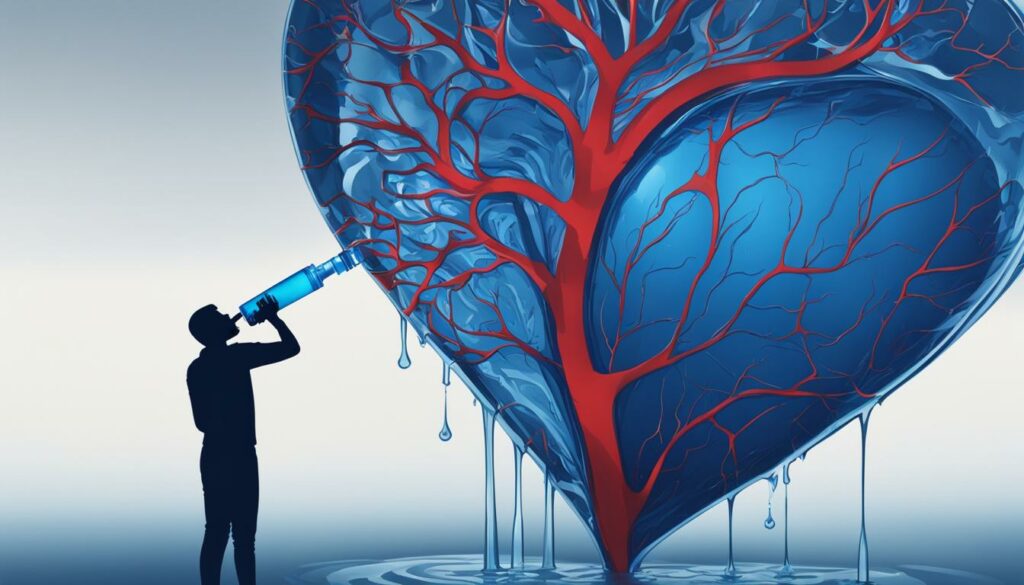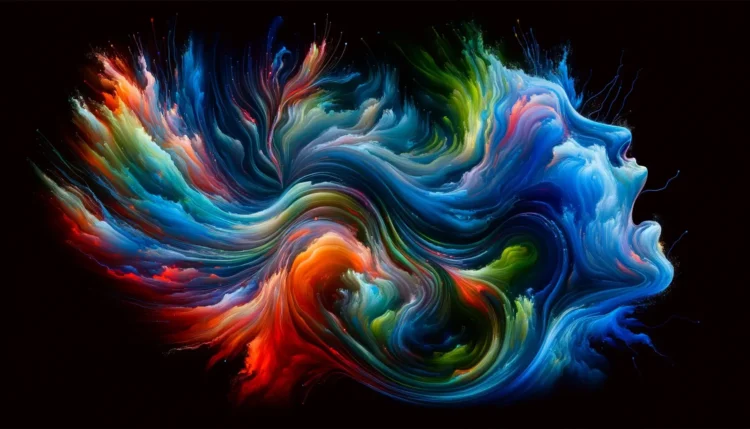Hydration plays a significant role in our overall health and well-being. But did you know that it can also have a direct impact on sexual performance? Maintaining proper hydration is crucial for optimal sexual function, and dehydration can potentially contribute to issues such as erectile dysfunction.
When we are dehydrated, our blood volume decreases, which can affect blood flow throughout the body, including to the genital area.
This reduced blood flow can make it more difficult to achieve and maintain an erection, leading to sexual performance issues. Additionally, dehydration can affect our mood, potentially causing stress, anxiety, and other factors that contribute to erectile dysfunction.
While research is still ongoing to establish a direct link between dehydration and erectile dysfunction, it is clear that staying hydrated is important for overall sexual health. By ensuring that our bodies have sufficient water, we can support optimal blood flow, maintain proper mood regulation, and enhance our sexual performance.
Key Takeaways:
- Dehydration can reduce blood volume and affect mood, potentially leading to erectile dysfunction.
- Staying hydrated is important for overall sexual health and performance.
- Recognizing the signs of dehydration, such as dry mouth, dizziness, and dark urine, is crucial.
- Drinking 6 to 8 glasses of water daily and maintaining a balanced diet can contribute to proper hydration.
- If experiencing persistent erectile dysfunction, it is recommended to seek medical help.
The Relationship Between Hydration and Erectile Dysfunction
When a person is dehydrated, their blood vessels become constricted due to a lack of blood volume, which impairs blood flow to all parts of the body, including the penis. Dehydration can also lead to the release of the enzyme angiotensin I, which causes blood vessels to constrict.
While little research has specifically looked at the direct connection between dehydration and erectile dysfunction, it is known that factors like stress, anxiety, and depression can contribute to ED. Therefore, the mood changes associated with dehydration could potentially lead to ED.
The Impact of Dehydration on Blood Vessels
Dehydration can have negative effects on blood vessel function throughout the body, including those that supply the penis. When the body is dehydrated, blood volume decreases, causing blood vessels to constrict and restrict blood flow. This constriction can hinder the ability to achieve and maintain an erection.
“Dehydration-induced constriction of blood vessels can impair blood flow to the penis, potentially contributing to erectile dysfunction.”
The Role of Angiotensin I
Dehydration triggers the release of angiotensin I, an enzyme that causes blood vessels to constrict. This further exacerbates the reduced blood flow to the penis, potentially affecting sexual function.
The Connection Between Mood and Erectile Dysfunction
While dehydration may not directly cause erectile dysfunction, it can contribute to changes in mood that may increase the risk of experiencing ED. Stress, anxiety, and depression are known contributing factors to erectile dysfunction. Dehydration can lead to these mood changes, thereby indirectly impacting sexual function.
The impact of hydration on sexual health is not solely limited to erectile dysfunction. Proper hydration is important for overall sexual function, as it helps maintain healthy blood flow and supports the body’s physiological processes.
Signs and Symptoms of Dehydration
Recognizing the signs and symptoms of dehydration is crucial for maintaining proper hydration, which can have significant benefits for sexual performance. When the body lacks sufficient water, it can experience various indicators of mild to severe dehydration. Some common signs of mild dehydration include:
- Dry mouth
- Dizziness
- Thirst
- Dark urine
- Fatigue
- Muscle cramps
If dehydration is left untreated, it can progress to severe dehydration, leading to more severe symptoms such as:
- Confusion
- Intense thirst
- Low blood pressure
- Lack of urine production
Monitoring your hydration levels is essential for optimal sexual health. One simple way to gauge your hydration status is to pay attention to the color of your urine. Clear urine indicates proper hydration, while dark-colored urine may signify dehydration. Additionally, not feeling thirsty is a good indicator that you are adequately hydrated.
Benefits of Staying Hydrated for Sexual Performance
Proper hydration offers numerous benefits for sexual performance and overall sexual health. When the body is well-hydrated, it helps maintain healthy blood flow, including to the genital area. Sufficient hydration can enhance lubrication and improve erectile function, allowing for more pleasurable and satisfying sexual experiences.
“Staying hydrated is key for optimal sexual performance. Proper hydration supports healthy blood flow and enhances lubrication, facilitating better erectile function and overall sexual satisfaction.”
In addition to its direct impact on sexual function, staying hydrated also promotes overall well-being, which can positively influence sexual experiences. Adequate hydration improves energy levels, reduces fatigue, and supports mental clarity, helping individuals feel more confident and engaged during intimate moments.
Making hydration a priority in your daily routine is a simple yet effective way to enhance your sexual performance and overall sexual health.

| Benefits of Staying Hydrated for Sexual Performance | |
|---|---|
| Improved blood flow to the genital area | |
| Enhanced lubrication | |
| Improved erectile function | |
| Increased energy levels | |
| Reduced fatigue | |
| Enhanced mental clarity |
Hydration and Causes of Erectile Dysfunction
While the direct link between dehydration and erectile dysfunction is not fully established, there are other known causes of ED that should be considered. Conditions that affect blood flow, certain medications, mental health disorders, anxiety, and a dysfunctional relationship with a partner can all contribute to ED.
If a person consistently has trouble achieving or maintaining an erection, it is important to consult with a doctor for a diagnosis.
“ED can be caused by a variety of factors, and hydration is just one piece of the puzzle. It’s important to address any underlying issues that may be contributing to the problem,” explains Dr. Emily Johnson, a renowned urologist.
Factors Contributing to Erectile Dysfunction
Several factors can contribute to the development of erectile dysfunction. These include:
- Conditions that affect blood flow, such as high blood pressure, diabetes, and heart disease.
- Certain medications, including those used to treat high blood pressure, depression, and prostate conditions.
- Mental health disorders, such as anxiety, depression, and stress.
- A dysfunctional relationship with a partner, including communication issues and unresolved conflicts.
Addressing these underlying causes, in addition to staying hydrated, can help improve sexual performance and overall well-being.
Treatment of Erectile Dysfunction
If you are experiencing persistent difficulties with erectile dysfunction, seeking medical help is recommended. A board-certified urologist can evaluate your condition and provide customized treatment options. Treatment for ED may include:
- Lifestyle modifications: This can include regular exercise, sufficient sleep, and reducing alcohol and tobacco use.
- Medications: There are various prescription medications available that can help improve erectile function.
- Intraurethral suppository therapy: This involves inserting a medication-filled suppository into the urethra to achieve an erection.
- Penile injections: Medications can be injected directly into the penis to enhance blood flow and improve erections.
- Vacuum erection devices: These devices create a vacuum around the penis, drawing blood into the area to promote an erection.
- Penile implants: Surgical implants can be used to provide rigid, long-lasting erections.
Working with healthcare professionals can help identify the most appropriate treatment option for your specific needs.
Maintaining Optimal Sexual Performance
Hydration is just one aspect of maintaining optimal sexual performance. To enhance your sexual health, consider the following tips:
- Stay hydrated: Drink plenty of water throughout the day to ensure proper hydration.
- Eat a balanced diet: Include fruits and vegetables in your diet, as they contain valuable nutrients that support sexual health.
- Exercise regularly: Engage in physical activity to improve blood flow and overall cardiovascular health.
- Manage stress: Practice stress reduction techniques, such as meditation or yoga, to improve your mental well-being.
- Communicate with your partner: Open and honest communication with your partner can help strengthen your relationship and enhance intimacy.
By taking a holistic approach to your sexual health, you can optimize your performance and enjoy a fulfilling and satisfying sex life.
| Causes of Erectile Dysfunction | Treatment Options |
|---|---|
| Conditions affecting blood flow | Lifestyle modifications |
| Certain medications | Medications |
| Mental health disorders | Intraurethral suppository therapy |
| Dysfunctional relationship with a partner | Penile injections |
How to Stay Hydrated for Better Sexual Performance
To optimize sexual performance, it is crucial to stay hydrated. Proper hydration is beneficial for overall sexual health and performance. By ensuring adequate hydration, individuals can enhance their sexual experience and improve their overall well-being.
Recommended Daily Water Intake
The recommended daily water intake for optimal hydration may vary depending on factors such as body size, physical activity level, and exposure to warm temperatures. However, a general guideline is to drink 6 to 8 glasses of water every day. This helps maintain proper hydration levels and supports sexual function.
More than Just Drinking Water
Staying hydrated goes beyond just drinking plain water. Consuming a balanced diet that includes fruits and vegetables can also contribute to overall hydration. These foods are not only rich in water content but also contain essential nutrients that promote sexual health. Incorporating hydrating foods into your diet can be an effective way to improve your sexual performance.
Importance of Hydration for Sexual Performance
Hydration plays a vital role in sexual performance.
When the body is properly hydrated, it can improve blood flow, which is essential for achieving and maintaining an erection. Hydration also helps in enhancing sexual stamina and reducing fatigue, allowing for more fulfilling sexual experiences. By prioritizing hydration, individuals can maximize their sexual potential.

“Proper hydration is crucial for sexual health and performance. By drinking enough water and consuming hydrating foods, individuals can optimize their sexual experiences and improve overall well-being.”
Seeking Help for Erectile Dysfunction
If you are facing consistent difficulties with erectile dysfunction (ED), it is crucial to seek medical assistance. A board-certified urologist can evaluate the underlying causes of ED and provide customized treatment plans to address your specific needs.
Additionally, making certain lifestyle modifications can help improve the symptoms of ED and enhance your sexual performance. Here are some steps you can take:
- Exercise regularly: Engaging in physical activity on a regular basis can improve blood flow throughout your body, including to the genital area. This can help mitigate the effects of ED and enhance sexual performance.
- Get sufficient sleep: Restful sleep is important for maintaining overall health and well-being, including sexual function. Aim for 7-9 hours of quality sleep each night.
- Reduce alcohol and tobacco use: Excessive alcohol consumption and tobacco use can have negative effects on sexual function and contribute to ED. Limiting or eliminating these substances can help improve symptoms.
In addition to lifestyle modifications, there are various treatment options available for ED. Your urologist may recommend one or a combination of the following:
- Medications: Prescription medications such as sildenafil (Viagra), tadalafil (Cialis), and vardenafil (Levitra) can help improve erectile function by increasing blood flow to the penis.
- Intraurethral suppository therapy: This treatment involves inserting a medicated suppository into the urethra to help achieve an erection.
- Penile injections: Injectable medications can be administered directly into the penis to stimulate an erection.
- Vacuum erection devices: Also known as penis pumps, these devices create a vacuum around the penis, drawing blood into the area to induce an erection. A constriction ring is then applied to the base of the penis to maintain the erection.
- Penile implants: In severe cases of ED, surgical insertion of a penile implant may be an option. This device allows for on-demand erections and can significantly improve sexual function.
It’s important to work closely with your healthcare professionals to address any underlying health issues that may contribute to ED. They can help determine the most appropriate course of action for your individual situation, taking into account factors such as overall health, lifestyle, and personal preferences.
Conclusion
Maintaining proper hydration is essential for overall sexual health and performance. A lack of hydration can potentially contribute to erectile dysfunction by reducing blood flow and affecting mood.
While further research is needed to establish a direct link between dehydration and erectile dysfunction, the benefits of staying hydrated for sexual performance are evident.
By recognizing the signs of dehydration, such as dry mouth, dizziness, and dark urine, individuals can take proactive steps to stay properly hydrated. Drinking an adequate amount of water and incorporating a balanced diet with fruits and vegetables can help ensure optimal hydration levels.
Consulting with a healthcare professional is crucial for individuals experiencing persistent erectile dysfunction. They can provide personalized advice and explore potential underlying causes of ED. However, staying hydrated is a simple yet effective way to support sexual function and improve overall well-being.
FAQ
Can dehydration affect sexual performance?
Yes, dehydration can potentially impact sexual performance. When a person is dehydrated, their blood vessels constrict, which can reduce blood flow to all parts of the body, including the penis. Dehydration can also lead to mood changes that contribute to erectile dysfunction (ED).
What are the signs and symptoms of dehydration?
Signs of mild dehydration include dry mouth, dizziness, thirst, dark urine, fatigue, and muscle cramps. If left untreated, dehydration can progress to severe dehydration with symptoms such as confusion, intense thirst, low blood pressure, and lack of urine production.
Can staying hydrated improve sexual performance?
Yes, staying hydrated is important for optimal sexual performance. By maintaining proper hydration, individuals can support blood flow and overall sexual health.
What other factors can contribute to erectile dysfunction (ED)?
While dehydration may play a role in ED, there are other known causes to consider. Conditions that affect blood flow, certain medications, mental health disorders, anxiety, and relationship issues can all contribute to ED.
How much water should I drink to stay hydrated?
The recommended daily water intake may vary based on factors such as body size, physical activity level, and exposure to warm temperatures. However, a general guideline is to drink 6 to 8 glasses of water daily.
Are there other ways to stay hydrated besides drinking water?
Yes, eating a balanced diet that includes fruits and vegetables can also contribute to overall hydration. These foods contain water and can help maintain hydration levels.
What should I do if I experience persistent erectile dysfunction?
If you consistently have trouble achieving or maintaining an erection, it is important to consult with a doctor. A board-certified urologist can evaluate the underlying causes and provide personalized treatment options.
Is staying properly hydrated important for overall well-being?
Yes, maintaining proper hydration is essential for overall health, including sexual health. Staying hydrated can support proper bodily function and contribute to improved sexual performance.




